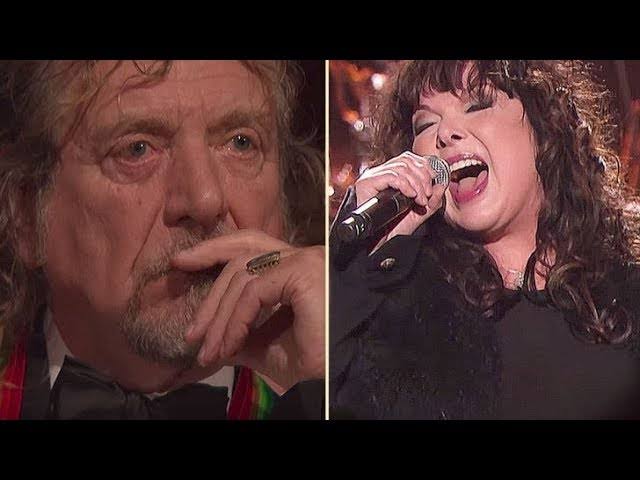In front of a packed Kennedy Center, the announcement echoes through the hall, a wave of anticipation ripples across the audience: “Ladies and Gentlemen, the Son of John Bonham, Jason Bonham… Heart’s Ann and Nancy Wilson!” The crowd erupts in applause, the atmosphere thick with excitement and reverence. As Nancy Wilson’s fingers glide across the strings, the first haunting notes of Stairway to Heaven fill the air. The familiar intro takes hold, pulling the audience into a shared moment of history, a musical pilgrimage to the heart of one of rock’s most iconic songs.
The room falls silent, the weight of the moment pressing down on every person in the room. Eyes are fixed on the stage, on the performance about to unfold—an interpretation of Stairway to Heaven that has been anticipated for years. But this isn’t just any rendition of the legendary song. This is the first time the son of John Bonham, the original drummer for Led Zeppelin, stands at the helm of the drums, carrying with him the legacy of his father’s thunderous beats. This is a moment that fuses the old with the new, the past with the present, as the band watches on, eyes glazed with emotion and nostalgia.
Ann Wilson’s voice enters, clear and powerful, as she delivers the first few verses. It’s unmistakably Stairway to Heaven, but there’s something new, something different in the air—an electric charge that speaks to the deep connection between past and present. The song, originally filled with the energy and intensity of Led Zeppelin’s rock spirit, now takes on a softer, almost reverential tone, infused with the strength and depth that Heart’s unique sound brings. The room seems to sway, as though every person in the hall is caught in the same current, each one navigating the waves of the song’s timeless beauty.
The band stands behind, watching with wide eyes, some misty-eyed, others lost in the groove, their minds racing through memories. Jason Bonham, behind the kit, plays with the precision and the heart that his father once did, but there’s a fluidity, a gentleness in his touch that comes from his own interpretation of the song. It’s not a mimicry of John Bonham’s legendary beats; it’s a tribute, a continuation of his father’s musical spirit.
As the song builds and Nancy’s guitar weaves its ethereal tones, a sense of history converges in this moment. It’s as though the walls of the Kennedy Center fade away, and in their place stands the memory of Zeppelin’s prime—alive and pulsing through the strings, the drums, and the voice that made the song immortal. The audience, wide-eyed and spellbound, understands the significance of what they are witnessing. This is not just a cover; it’s a celebration, an honoring of the legacy that changed rock music forever.
When the final, transcendent note rings out, there’s a brief moment of stillness, a pause where the room seems to hold its breath. And then, the applause. Thunderous. Uncontrollable. It’s not just for the performance; it’s for the spirit of Led Zeppelin, for the legacy of John Bonham, for the timeless power of Stairway to Heaven that has somehow found a way to live on through new hands and new voices.
In that moment, the music transcends time, as if the past and present have merged into one, and a new chapter in rock history is written.
